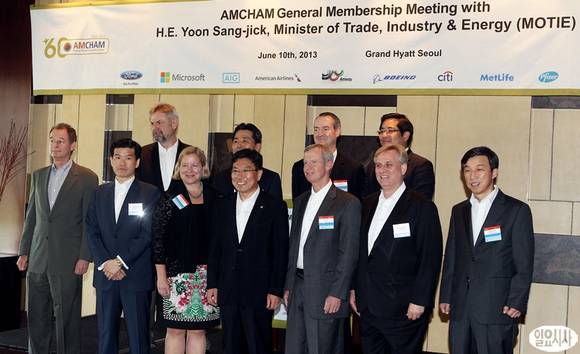Foreign firms call for predictable policies
AMCHAM says excessive government intervention could dampen foreign investment
By Korea HeraldPublished : June 10, 2013 - 20:18
American companies doing business in Korea on Monday voiced their concerns over toughened government regulations under President Park Geun-hye, calling for more predictable and transparent policies.
The American Chamber of Commerce in Korea held a luncheon meeting with Trade, Industry and Minister Yoon Sang-jick at a Seoul hotel, with some 100 company representatives and government authorities in attendance.
AMCHAM members, citing recent business guidelines made by the National Commission for Corporate Partnership, pointed out that these kinds of regulations could be a hurdle for foreign investment.
The American Chamber of Commerce in Korea held a luncheon meeting with Trade, Industry and Minister Yoon Sang-jick at a Seoul hotel, with some 100 company representatives and government authorities in attendance.
AMCHAM members, citing recent business guidelines made by the National Commission for Corporate Partnership, pointed out that these kinds of regulations could be a hurdle for foreign investment.

Yoon assured there should be no major concern for foreign businesses, saying the NCCP does not make government regulations and the ministry is closely watching their activities.
“We are monitoring their decisions so they do not cross the line,” he said.
In response to some regulatory concerns by foreign businesses, the trade minister reaffirmed that the government would extend support to create a more business-friendly environment in Korea, including the introduction of new free trade pacts.
“With the Korea-U.S. FTA, we have created a strong economic platform for prosperity between two countries. The new government’s policy for creative economy and more investment would strengthen partnerships among companies,” he said.
He also emphasized the enhanced role of American companies in realizing the creative economy agenda, which aims to foster a creative economy ecosystem where the convergence of creative ideas with science, technology and communications technology leads to the creation of new industries and decent jobs.
“The ministry, in particular, is working on creating a smart manufacturing sector that transforms existing infrastructures. We also plan to pour a bigger budget into the project,” he said.
“There would be more business opportunities both for Korean and foreign businesses.”
Since her presidential campaign, President Park has pledged to boost shared growth between large conglomerates and smaller firms, leading to toughened regulations especially on big businesses.
Companies including foreign firms, however, complain the government’s excessive intervention could dampen the market environment and, ultimately, new investments.
Similar discussions were made on Friday when the European Chamber of Commerce in Korea met Fair Trade Commission chairman Noh Dae-lae.
Asked about risks from the recent “model contract” that the antitrust regulator recommended for franchise and pharmaceutical businesses, Noh said: “Our principle is that all business activities should be controlled by the market. We intervene into a very limited number of cases that seriously violate that principle.”
By Lee Ji-yoon (jylee@heraldcorp.com)
-
Articles by Korea Herald








![[KH Explains] Hyundai-backed Motional’s struggles deepen as Tesla eyes August robotaxi debut](http://res.heraldm.com/phpwas/restmb_idxmake.php?idx=644&simg=/content/image/2024/05/16/20240516050605_0.jpg&u=20240516155018)










